The Application of Catholic Social Principles in Indigenous Australia
VerifiedAdded on 2022/10/17
|5
|1326
|14
Essay
AI Summary
This essay examines the application of Catholic social principles to the challenges faced by Indigenous communities in Australia. The essay highlights the social disparities between Indigenous and urban populations, emphasizing the lack of access to civil rights, education, and healthcare. It explores how the nine principles of Catholic social teaching, including the dignity of the human person, common good, and solidarity, can address these issues. The essay suggests that promoting love and justice, fostering cultural competence, and establishing collaborative community care frameworks are crucial. It underscores the importance of government support, culturally sensitive communication, and the integration of Indigenous perspectives in social and educational services. The essay also emphasizes the need for training for social workers, community nurses, educators, and business managers. The essay references various scholarly articles to support its arguments. The essay concludes by reinforcing the need for systematic laws and regulations to ensure equity and common good for Indigenous Australians.
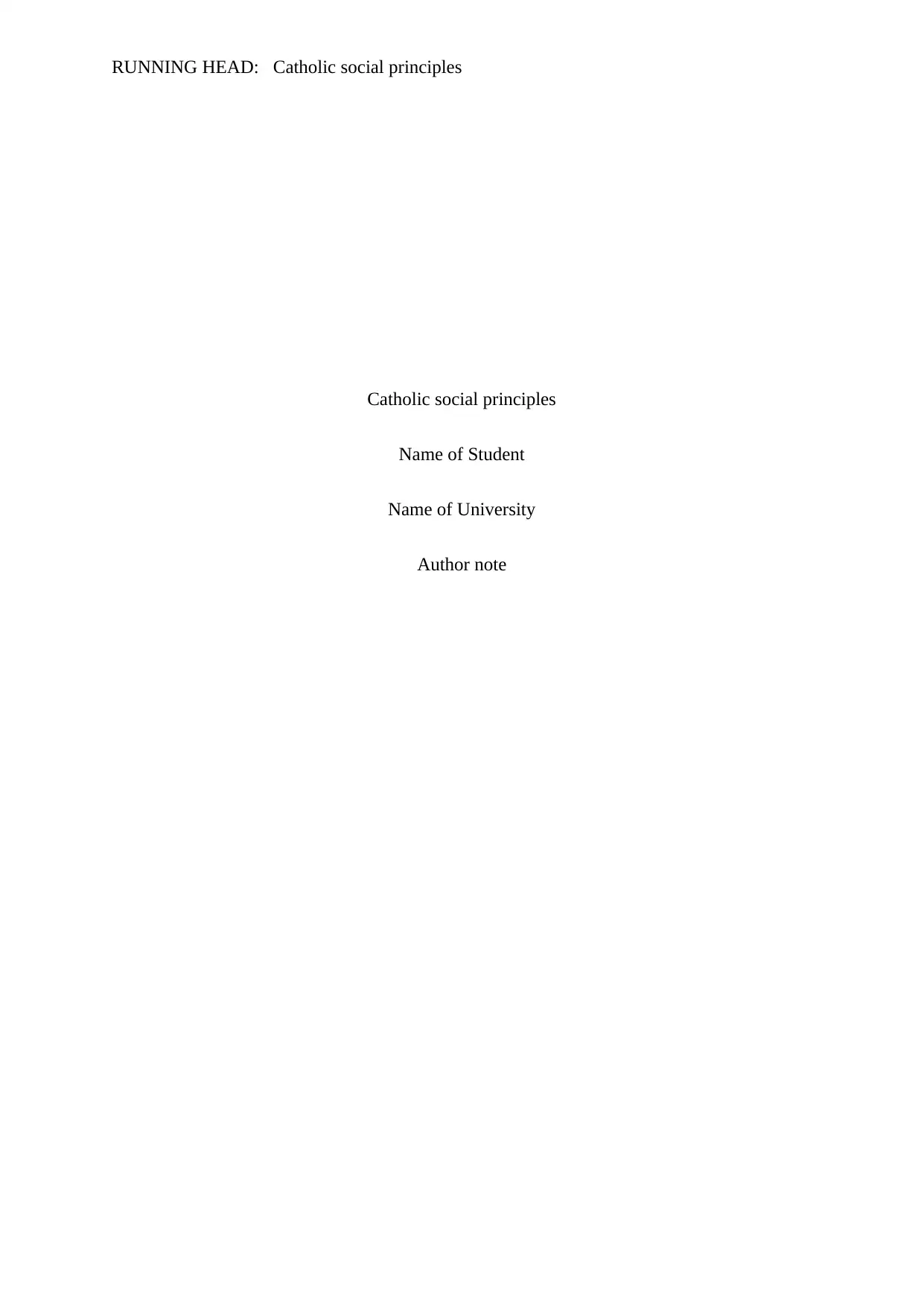
RUNNING HEAD: Catholic social principles
Catholic social principles
Name of Student
Name of University
Author note
Catholic social principles
Name of Student
Name of University
Author note
Paraphrase This Document
Need a fresh take? Get an instant paraphrase of this document with our AI Paraphraser
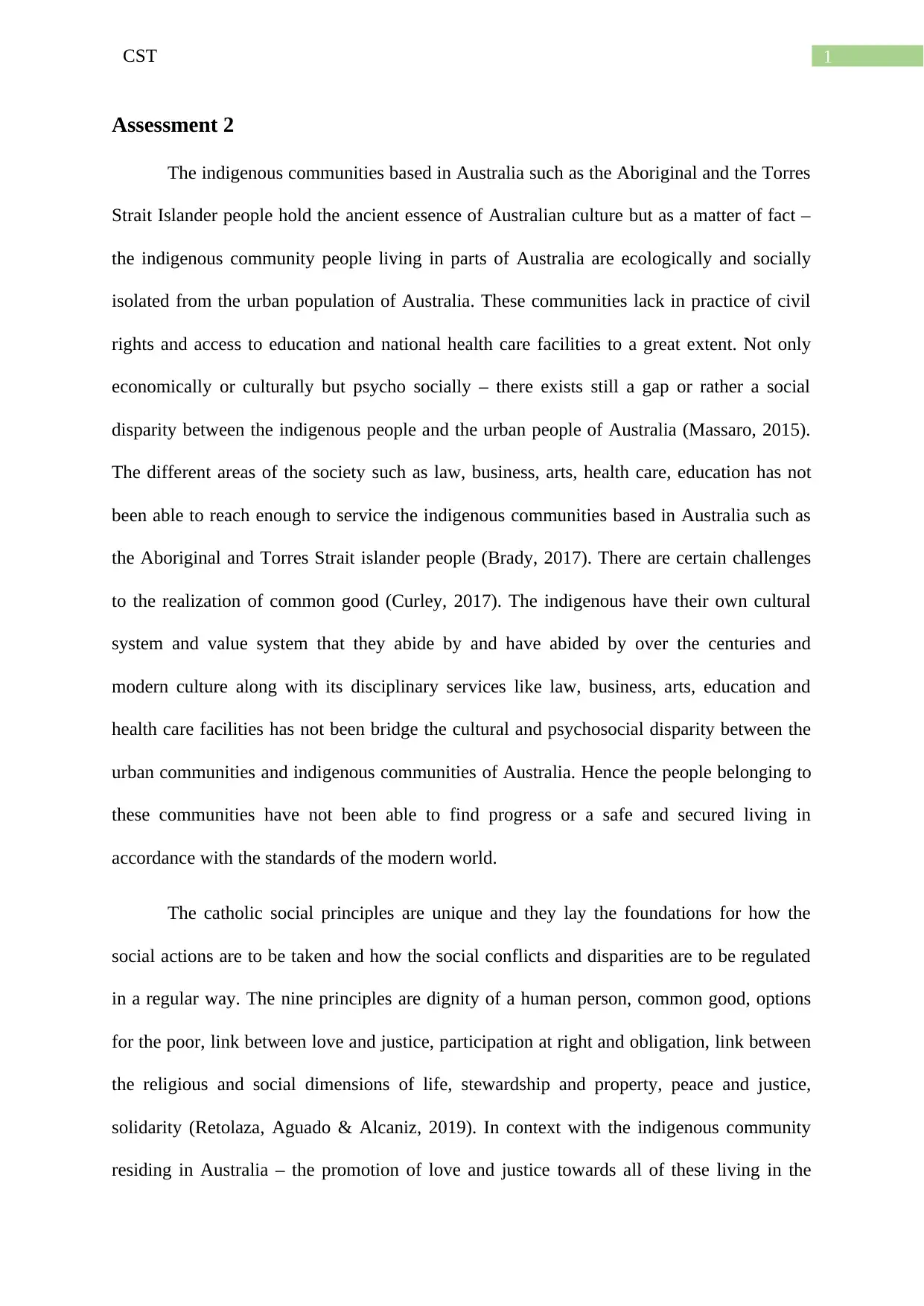
1CST
Assessment 2
The indigenous communities based in Australia such as the Aboriginal and the Torres
Strait Islander people hold the ancient essence of Australian culture but as a matter of fact –
the indigenous community people living in parts of Australia are ecologically and socially
isolated from the urban population of Australia. These communities lack in practice of civil
rights and access to education and national health care facilities to a great extent. Not only
economically or culturally but psycho socially – there exists still a gap or rather a social
disparity between the indigenous people and the urban people of Australia (Massaro, 2015).
The different areas of the society such as law, business, arts, health care, education has not
been able to reach enough to service the indigenous communities based in Australia such as
the Aboriginal and Torres Strait islander people (Brady, 2017). There are certain challenges
to the realization of common good (Curley, 2017). The indigenous have their own cultural
system and value system that they abide by and have abided by over the centuries and
modern culture along with its disciplinary services like law, business, arts, education and
health care facilities has not been bridge the cultural and psychosocial disparity between the
urban communities and indigenous communities of Australia. Hence the people belonging to
these communities have not been able to find progress or a safe and secured living in
accordance with the standards of the modern world.
The catholic social principles are unique and they lay the foundations for how the
social actions are to be taken and how the social conflicts and disparities are to be regulated
in a regular way. The nine principles are dignity of a human person, common good, options
for the poor, link between love and justice, participation at right and obligation, link between
the religious and social dimensions of life, stewardship and property, peace and justice,
solidarity (Retolaza, Aguado & Alcaniz, 2019). In context with the indigenous community
residing in Australia – the promotion of love and justice towards all of these living in the
Assessment 2
The indigenous communities based in Australia such as the Aboriginal and the Torres
Strait Islander people hold the ancient essence of Australian culture but as a matter of fact –
the indigenous community people living in parts of Australia are ecologically and socially
isolated from the urban population of Australia. These communities lack in practice of civil
rights and access to education and national health care facilities to a great extent. Not only
economically or culturally but psycho socially – there exists still a gap or rather a social
disparity between the indigenous people and the urban people of Australia (Massaro, 2015).
The different areas of the society such as law, business, arts, health care, education has not
been able to reach enough to service the indigenous communities based in Australia such as
the Aboriginal and Torres Strait islander people (Brady, 2017). There are certain challenges
to the realization of common good (Curley, 2017). The indigenous have their own cultural
system and value system that they abide by and have abided by over the centuries and
modern culture along with its disciplinary services like law, business, arts, education and
health care facilities has not been bridge the cultural and psychosocial disparity between the
urban communities and indigenous communities of Australia. Hence the people belonging to
these communities have not been able to find progress or a safe and secured living in
accordance with the standards of the modern world.
The catholic social principles are unique and they lay the foundations for how the
social actions are to be taken and how the social conflicts and disparities are to be regulated
in a regular way. The nine principles are dignity of a human person, common good, options
for the poor, link between love and justice, participation at right and obligation, link between
the religious and social dimensions of life, stewardship and property, peace and justice,
solidarity (Retolaza, Aguado & Alcaniz, 2019). In context with the indigenous community
residing in Australia – the promotion of love and justice towards all of these living in the
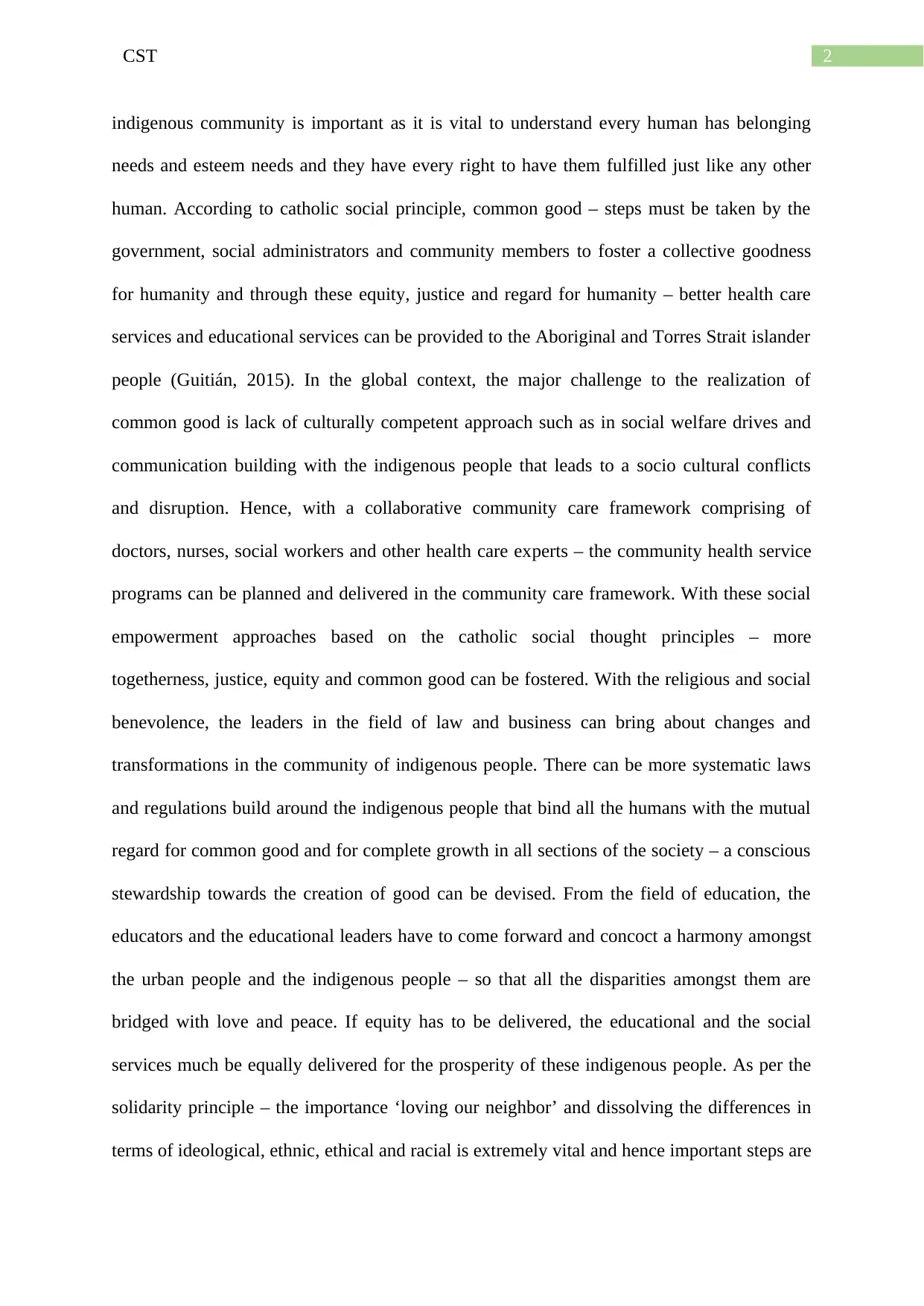
2CST
indigenous community is important as it is vital to understand every human has belonging
needs and esteem needs and they have every right to have them fulfilled just like any other
human. According to catholic social principle, common good – steps must be taken by the
government, social administrators and community members to foster a collective goodness
for humanity and through these equity, justice and regard for humanity – better health care
services and educational services can be provided to the Aboriginal and Torres Strait islander
people (Guitián, 2015). In the global context, the major challenge to the realization of
common good is lack of culturally competent approach such as in social welfare drives and
communication building with the indigenous people that leads to a socio cultural conflicts
and disruption. Hence, with a collaborative community care framework comprising of
doctors, nurses, social workers and other health care experts – the community health service
programs can be planned and delivered in the community care framework. With these social
empowerment approaches based on the catholic social thought principles – more
togetherness, justice, equity and common good can be fostered. With the religious and social
benevolence, the leaders in the field of law and business can bring about changes and
transformations in the community of indigenous people. There can be more systematic laws
and regulations build around the indigenous people that bind all the humans with the mutual
regard for common good and for complete growth in all sections of the society – a conscious
stewardship towards the creation of good can be devised. From the field of education, the
educators and the educational leaders have to come forward and concoct a harmony amongst
the urban people and the indigenous people – so that all the disparities amongst them are
bridged with love and peace. If equity has to be delivered, the educational and the social
services much be equally delivered for the prosperity of these indigenous people. As per the
solidarity principle – the importance ‘loving our neighbor’ and dissolving the differences in
terms of ideological, ethnic, ethical and racial is extremely vital and hence important steps are
indigenous community is important as it is vital to understand every human has belonging
needs and esteem needs and they have every right to have them fulfilled just like any other
human. According to catholic social principle, common good – steps must be taken by the
government, social administrators and community members to foster a collective goodness
for humanity and through these equity, justice and regard for humanity – better health care
services and educational services can be provided to the Aboriginal and Torres Strait islander
people (Guitián, 2015). In the global context, the major challenge to the realization of
common good is lack of culturally competent approach such as in social welfare drives and
communication building with the indigenous people that leads to a socio cultural conflicts
and disruption. Hence, with a collaborative community care framework comprising of
doctors, nurses, social workers and other health care experts – the community health service
programs can be planned and delivered in the community care framework. With these social
empowerment approaches based on the catholic social thought principles – more
togetherness, justice, equity and common good can be fostered. With the religious and social
benevolence, the leaders in the field of law and business can bring about changes and
transformations in the community of indigenous people. There can be more systematic laws
and regulations build around the indigenous people that bind all the humans with the mutual
regard for common good and for complete growth in all sections of the society – a conscious
stewardship towards the creation of good can be devised. From the field of education, the
educators and the educational leaders have to come forward and concoct a harmony amongst
the urban people and the indigenous people – so that all the disparities amongst them are
bridged with love and peace. If equity has to be delivered, the educational and the social
services much be equally delivered for the prosperity of these indigenous people. As per the
solidarity principle – the importance ‘loving our neighbor’ and dissolving the differences in
terms of ideological, ethnic, ethical and racial is extremely vital and hence important steps are
⊘ This is a preview!⊘
Do you want full access?
Subscribe today to unlock all pages.

Trusted by 1+ million students worldwide
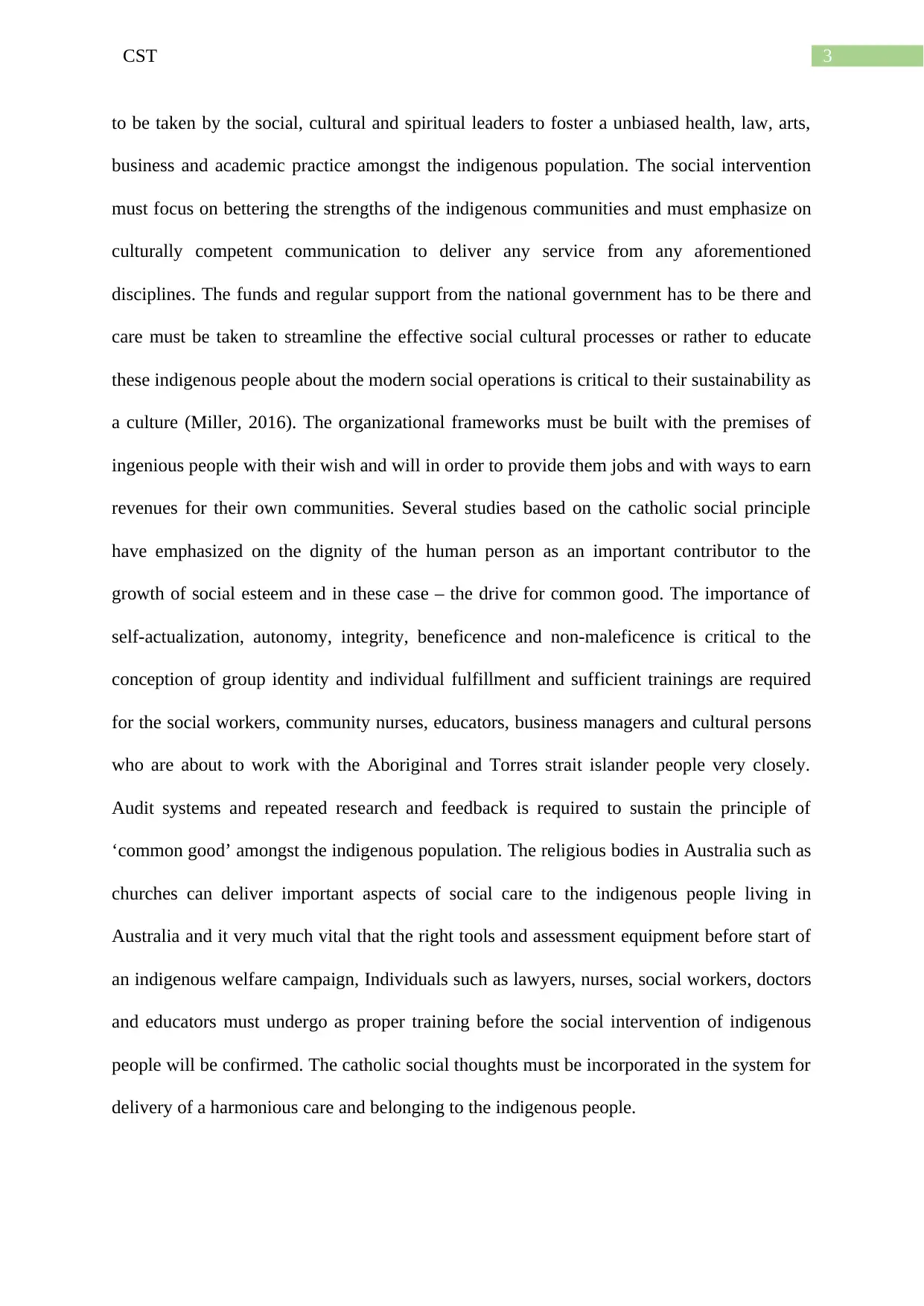
3CST
to be taken by the social, cultural and spiritual leaders to foster a unbiased health, law, arts,
business and academic practice amongst the indigenous population. The social intervention
must focus on bettering the strengths of the indigenous communities and must emphasize on
culturally competent communication to deliver any service from any aforementioned
disciplines. The funds and regular support from the national government has to be there and
care must be taken to streamline the effective social cultural processes or rather to educate
these indigenous people about the modern social operations is critical to their sustainability as
a culture (Miller, 2016). The organizational frameworks must be built with the premises of
ingenious people with their wish and will in order to provide them jobs and with ways to earn
revenues for their own communities. Several studies based on the catholic social principle
have emphasized on the dignity of the human person as an important contributor to the
growth of social esteem and in these case – the drive for common good. The importance of
self-actualization, autonomy, integrity, beneficence and non-maleficence is critical to the
conception of group identity and individual fulfillment and sufficient trainings are required
for the social workers, community nurses, educators, business managers and cultural persons
who are about to work with the Aboriginal and Torres strait islander people very closely.
Audit systems and repeated research and feedback is required to sustain the principle of
‘common good’ amongst the indigenous population. The religious bodies in Australia such as
churches can deliver important aspects of social care to the indigenous people living in
Australia and it very much vital that the right tools and assessment equipment before start of
an indigenous welfare campaign, Individuals such as lawyers, nurses, social workers, doctors
and educators must undergo as proper training before the social intervention of indigenous
people will be confirmed. The catholic social thoughts must be incorporated in the system for
delivery of a harmonious care and belonging to the indigenous people.
to be taken by the social, cultural and spiritual leaders to foster a unbiased health, law, arts,
business and academic practice amongst the indigenous population. The social intervention
must focus on bettering the strengths of the indigenous communities and must emphasize on
culturally competent communication to deliver any service from any aforementioned
disciplines. The funds and regular support from the national government has to be there and
care must be taken to streamline the effective social cultural processes or rather to educate
these indigenous people about the modern social operations is critical to their sustainability as
a culture (Miller, 2016). The organizational frameworks must be built with the premises of
ingenious people with their wish and will in order to provide them jobs and with ways to earn
revenues for their own communities. Several studies based on the catholic social principle
have emphasized on the dignity of the human person as an important contributor to the
growth of social esteem and in these case – the drive for common good. The importance of
self-actualization, autonomy, integrity, beneficence and non-maleficence is critical to the
conception of group identity and individual fulfillment and sufficient trainings are required
for the social workers, community nurses, educators, business managers and cultural persons
who are about to work with the Aboriginal and Torres strait islander people very closely.
Audit systems and repeated research and feedback is required to sustain the principle of
‘common good’ amongst the indigenous population. The religious bodies in Australia such as
churches can deliver important aspects of social care to the indigenous people living in
Australia and it very much vital that the right tools and assessment equipment before start of
an indigenous welfare campaign, Individuals such as lawyers, nurses, social workers, doctors
and educators must undergo as proper training before the social intervention of indigenous
people will be confirmed. The catholic social thoughts must be incorporated in the system for
delivery of a harmonious care and belonging to the indigenous people.
Paraphrase This Document
Need a fresh take? Get an instant paraphrase of this document with our AI Paraphraser
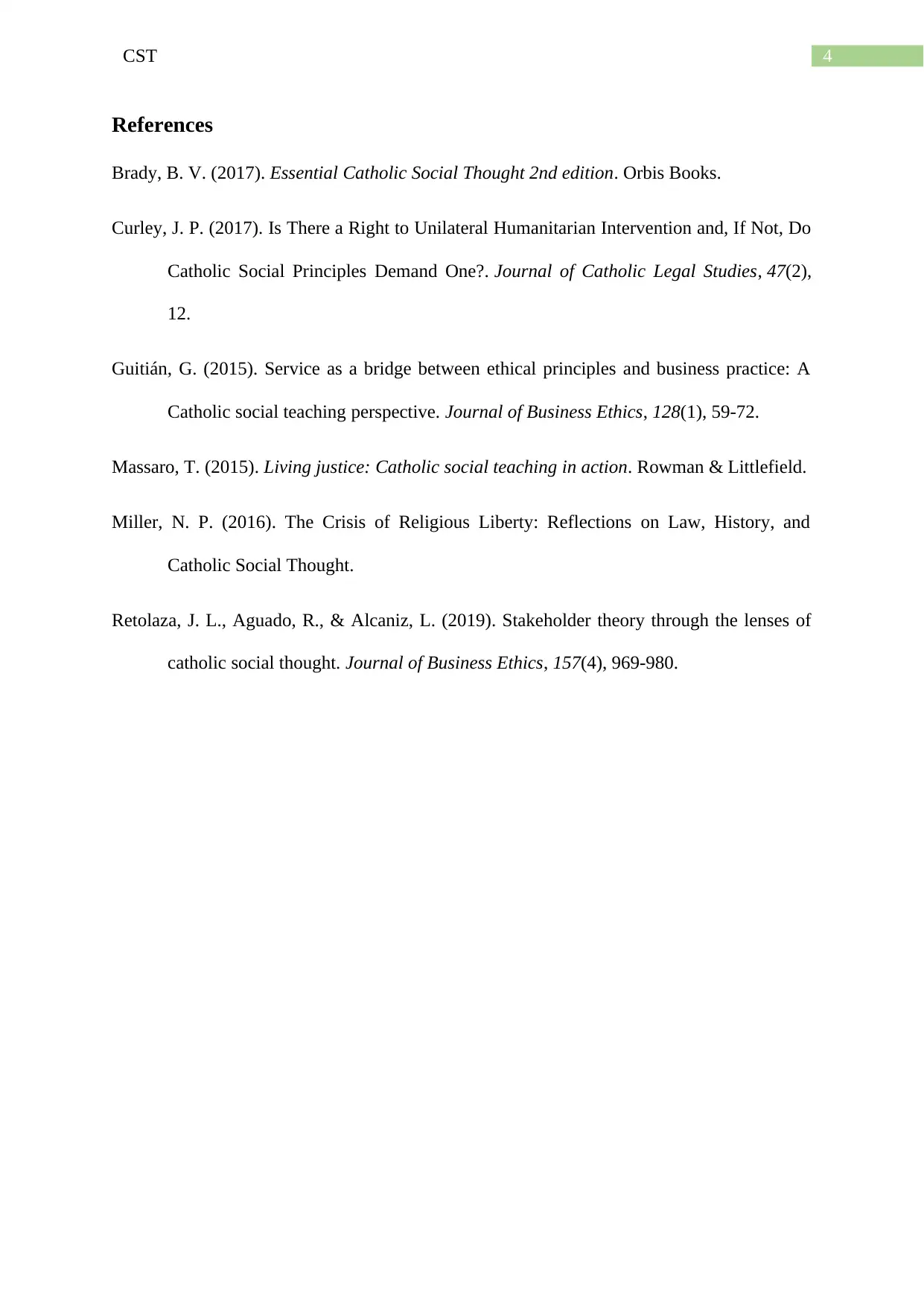
4CST
References
Brady, B. V. (2017). Essential Catholic Social Thought 2nd edition. Orbis Books.
Curley, J. P. (2017). Is There a Right to Unilateral Humanitarian Intervention and, If Not, Do
Catholic Social Principles Demand One?. Journal of Catholic Legal Studies, 47(2),
12.
Guitián, G. (2015). Service as a bridge between ethical principles and business practice: A
Catholic social teaching perspective. Journal of Business Ethics, 128(1), 59-72.
Massaro, T. (2015). Living justice: Catholic social teaching in action. Rowman & Littlefield.
Miller, N. P. (2016). The Crisis of Religious Liberty: Reflections on Law, History, and
Catholic Social Thought.
Retolaza, J. L., Aguado, R., & Alcaniz, L. (2019). Stakeholder theory through the lenses of
catholic social thought. Journal of Business Ethics, 157(4), 969-980.
References
Brady, B. V. (2017). Essential Catholic Social Thought 2nd edition. Orbis Books.
Curley, J. P. (2017). Is There a Right to Unilateral Humanitarian Intervention and, If Not, Do
Catholic Social Principles Demand One?. Journal of Catholic Legal Studies, 47(2),
12.
Guitián, G. (2015). Service as a bridge between ethical principles and business practice: A
Catholic social teaching perspective. Journal of Business Ethics, 128(1), 59-72.
Massaro, T. (2015). Living justice: Catholic social teaching in action. Rowman & Littlefield.
Miller, N. P. (2016). The Crisis of Religious Liberty: Reflections on Law, History, and
Catholic Social Thought.
Retolaza, J. L., Aguado, R., & Alcaniz, L. (2019). Stakeholder theory through the lenses of
catholic social thought. Journal of Business Ethics, 157(4), 969-980.
1 out of 5
Related Documents
Your All-in-One AI-Powered Toolkit for Academic Success.
+13062052269
info@desklib.com
Available 24*7 on WhatsApp / Email
![[object Object]](/_next/static/media/star-bottom.7253800d.svg)
Unlock your academic potential
Copyright © 2020–2026 A2Z Services. All Rights Reserved. Developed and managed by ZUCOL.




